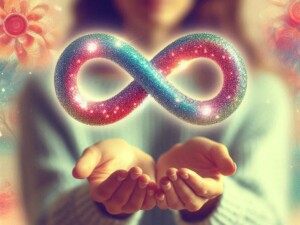Here are 10 stereotypes about autistic people that are most hated by autistic people themselves.
Thanks to these stereotypes, many autistic people continue to be denied employment opportunities.
Another fall-out of these myths is that sometimes, when an adult is late-diagnosed with autism, their family members refuse to believe it.
This isn’t necessarily because they think their family member “can’t possibly be autistic,” but because the idea that a family member has autism makes them feel embarrassment or shame.
What 10 stereotypes about autistic people do actually autistic people hate the most?
#1 Autistic People Are Mentally Challenged

©Lorra Garrick
This means mentally handicapped, mentally slow, has a low IQ.
Research indicates that severe autism is associated with more pronounced cognitive impairments.
A study by Gillberg et al. (2012) found greater cognitive challenges in severe autism cases compared to milder forms.
So the association between Autism Spectrum Disorder and intellectual disability (ID) clearly exists.
But this is only an association, and the form of ASD associated with ID is severe, rather than high functioning.
There are reasons for the association, but it doesn’t mean that autism actually causes an ID, or that an ID causes autism, or that autism itself is an ID.
- Neurological Differences: Severe autism often involves significant brain development differences, impacting cognitive function.
Neuroimaging studies show structural and connectivity differences in severe or high-support-needs autism cases (Horder et al., 2013).
- Genetic Factors: Some genetic mutations linked to autism also contribute to intellectual disabilities.
For instance, genetic syndromes such as Rett and Fragile X are associated with both conditions (Kau et al., 2011).
- Developmental Factors: Prenatal and early developmental factors can impact brain development, influencing both autism and intellectual disabilities (Zwaigenbaum et al., 2015).
Another reason for the myth is that some Autists with average to very high IQ may still exhibit behaviors that, to neurotypical people, seem suggestive of low intelligence – such as some stimming behaviors, a peculiar voice, clumsiness and limited speech.
Another reason for the generalized belief, held by some neurotypicals, that those on the Spectrum are usually not very smart, is the way autism has been portrayed in movies and TV over the decades.
#2 Autistic People Can’t Have Successful or Professional Careers

Freepik.com/pressfoto
Profiles of professional autistic individuals are all over LinkedIn. There’s just a ton of them.
This includes mental health specialists such as psychotherapists, a sales team leader and a U.S. Army combat medic.
At autism social activities I have met Autistics who were an architect, seventh grade English teacher, IT specialist, computer programmer, school nurse, a few lawyers, a graphic designer, a karate school co-owner, a drone specialist and many more.
I’ve written profiles about Autistics who are personal trainers and one who owns a hair salon.
I myself, with clinically diagnosed autism, am a former personal trainer for a large crowded gym.
I was editor of a fitness magazine for 12 years and am a successful content creator.
People with autism are NOT limited to repetitive warehouse or data entry work!
#3 School Shooters Are More Likely to Be Autistic

©Lorra Garrick
This myth probably comes from the fact that seemingly every student who shoots up a school has a history of being bullied, with classmates describing him as being odd, socially awkward and introverted.
But neurotypicals can be viewed in this way as well. There is no evidence that a diagnosis of autism is disproportionately represented among school shooters.
A student need not be on the Spectrum to be the target of relentless bullying, which is a common denominator in these shooters.
Perhaps most school shooters would have a diagnosis of sociopathic personality disorder if they were ever evaluated.
#4 Autistic People Lack Empathy

©Lorra Garrick
This is one of the biggest stereotypes of ASD. It simply isn’t true.
Those on the Spectrum often express empathy differently than most neurotypicals.
An Autist may be more emotionally subdued – because this is their nature in certain settings.
They may seem emotionless or robotic under circumstances that would bring out a robust emotional response in the average NT.
Autists show empathy in different ways, that’s all. One of the most common ways they express empathy, which is sometimes perceived by NTs to be self-absorption, is when they begin describing a personal experience in response to someone telling them a similar experience.
I’ve done this all my life. For example, a woman told me about a fall she had taken.
My brain bypassed the instinct to ask if she’d been hurt, “oh you poor thing; that must’ve messed up your entire day…”
Instead I went straight to telling her about my fall on the ice-coated wooden steps outside my apartment.
Autists tend to respond this way when someone relates to them a bad experience.
Another way Autistics show empathy is by — when someone shares an unfortunate situation — promptly describing to them an inventory of solutions, often in a neutral or matter-of-fact way.
The DSM-5 (booklet of classification of mental disorders used by U.S. mental health professionals) defines antisocial personality disorder as routine disregard for the rights of others. That sounds a lot like lacking empathy.
#5 Autistic People Are Vulnerable and Weak

©Lorra Garrick
We don’t like the assumption that we’re vulnerable and weak.
Though it’s a fact that autistic people are more likely than NTs to be bullied or harassed, this increased likelihood is NOT the same as “all.”
I’m sure that karate school co-owner would vehemently disagree with this stereotype.
There are plenty of autistic individuals who are Type A personalities or Alpha types.
They are highly verbal, assertive and are go-getters in life.
They are very forceful in the business world.
There are plenty of timid and meek neurotypical people.
I’ve met many “vulnerable and weak” neurotypicals. That’s because many insecure, self-doubting and easily-intimidated people are NTs.
It stands to reason that how a person is raised, the kind of environment they grow up in, would strongly influence how self-confident or strong they turn out to be.
But sometimes, an individual has a built-in or inner strength and resolve – even if they’re on the Spectrum.
People with ASD should never be the recipients of automatic assumptions. Each autistic individual is unique!
#6 People Outgrow Their Autism

©Lorra Garrick
If this were true, you’d never see adults with visible autism.
But I’ll confess: I used to believe that kids outgrew their autism – if they were given intensive therapy, after which, they’d no longer be autistic.
This thinking is based on lack of information and education about ASD. And it still persists today.
Autism is a neurotype, a way the brain processes information.
For people with high functioning autism, these differences may not be evident until early primary school.
Or, if they’re evident earlier, the signs that the child thinks and sees the world differently may go under the radar of their parents, especially if one of the parents has undiagnosed autism.
“I was like that at her age; there’s nothing wrong with her,” is a common observation by a parent.
Another observation may be, “Well of course he’s different; he’s smarter than his peers and has musical and artistic gifts.”
But as the Level 1 (minimal support needs) autistic child gets older, the expectation to comply to social norms gets stronger.
As a result, new, atypical behaviors may begin surfacing to cope.
Autism is the way a person’s brain operates; it’s a lifelong neurotype that cannot be removed, though external neurodivergent behaviors can be consciously suppressed to pass as neurotypical.
#7 There Is Female and Male Autism

©Lorra Garrick
Autism is autism. The definition of ASD that’s in the DSM-5 does not make distinctions between males and females.
Either a human fits the criteria or doesn’t; gender doesn’t matter.
Some NTs hold to the belief that “female autism” is a whole different kind of autism.
What’s actually going on is that autistic females tend to make greater attempts at hiding their autistic features than do males on the Spectrum.
Even from elementary school age, autistic girls may already be practicing and rehearsing “how to act” to fit in with classmates.
Autistic males mask too, but this coping mechanism seems to be more prevalent in females.
But their actual ASD is no different just because they’re female.
Females with autism also are more likely than autistic males to have socially acceptable obsessions or special interests, such as reading, houseplants, linguistics, and arts and crafts – while males with ASD are more likely to be hyperfixated on topics such as train whistles, laundry machines, roller coasters and powerlines.
Both genders, though, can have “girlie” special interests, “masculine” special interests or special interests in universally popular things such as videogames or Dungeons & Dragons.
However, again, their actual autism is no different.
#8 “We can’t be in public places or crowds without having sensory overload.”

Shutterstock/9nong
I’ve witnessed firsthand Autistics having absolutely no problems in public noisy venues full of people.
People with ASD who find crowds and/or the multiple stimuli in community settings uncomfortable will make strong efforts to avoid those venues.
Let’s not stereotype all autistic people as wearing noise-cancelling headphones in public or sunglasses inside buildings.
I myself never experience sensory overload in public, even in thick crowds, unless you want to consider it sensory overload when I’m the only person at the gym gagging on someone’s rancid breath from 10 feet away.
Furthermore, not all Autists have meltdowns. Many do, indeed. But there exist no studies naming the suspected percentage of autistic individuals who have neurologically-based meltdowns from sensory overload or unexpected changes in routine.
#9 Being Compared to TV Characters with Coded Autism

In a thread, an autistic man wrote, “Not a fan of being compared to Spock, Data or Sheldon f*****g Cooper.”
Some may find it complimentary to receive such comparisons.
But others don’t like this at all, at least if they don’t like the character they’re being compared to.
#10 All Autistic People Are the Same

©Lorra Garrick
This is no more true than “All neurotypical people are the same.”
There is NO such thing as, “You can’t possibly be autistic because the man down the street is autistic and you’re nothing like him.”
Unfortunately, I fell for this stereotype for nearly all my life, which contributed to my diagnosis occurring in middle-age rather than much sooner.
I thought I couldn’t be autistic because I wasn’t “weak and vulnerable.”
I thought I couldn’t possibly be autistic because I could love another human being and wanted romance.
I thought I couldn’t be on the Spectrum because I was capable of talking quite a bit, even with strangers.
But truth is, we all don’t fit into a box. There is no autism template.
Though an ASD diagnosis requires hitting a minimum number of criteria, this doesn’t mean we are all the same.
The quietest person in a room full of people could have autism, while the loudest and most talkative may also be autistic.
We don’t all have monotone voices. We don’t all avoid eye contact. We don’t all flap our hands or hate when different foods on our plate touch.
The above list is certainly not complete, but those 10 stereotypes are a great start to helping NTs understand ASD better.
IT’S A SPECTRUM!
Source: wrongplanet.net/forums/viewtopic.php?t=412662
 Lorra Garrick has been covering medical and fitness topics for many years, having written thousands of articles for print magazines and websites, including as a ghostwriter. She’s also a former ACE-certified personal trainer. In 2022 she received a diagnosis of Level 1 Autism Spectrum Disorder and subsequently has developed an intense interest in ASD.
Lorra Garrick has been covering medical and fitness topics for many years, having written thousands of articles for print magazines and websites, including as a ghostwriter. She’s also a former ACE-certified personal trainer. In 2022 she received a diagnosis of Level 1 Autism Spectrum Disorder and subsequently has developed an intense interest in ASD.
.



























